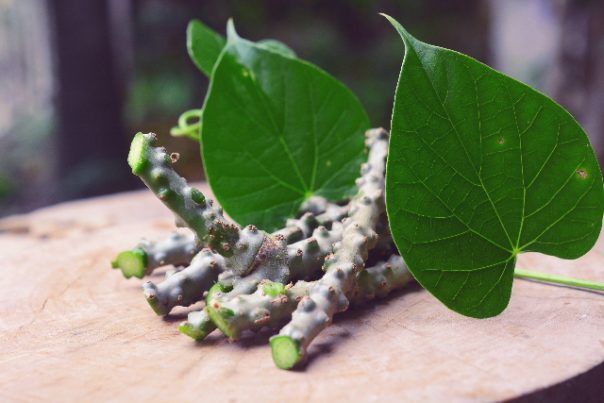
Protect your liver from heavy metals and oxidative stress with heart-leaved moonseed
Wednesday, May 22, 2019 by Michelle Simmons
http://www.naturalnewsherbs.com/2019-05-22-heart-leaved-moonseed-protects-liver-heavy-metals-oxidative-stress.html

Exposure to heavy metals like cadmium is harmful to your health, and one of the most commonly affected organs is the liver. To protect your liver from these toxic heavy metals, researchers at the National Health Research Institutes in Taiwan and Bharathiar University in India suggest taking heart-leaved moonseed (Tinospora cordifolia) extract. They reached this conclusion after looking at the protective effects of heart-leaved moonseed extract on cadmium-induced liver damage in rats.
Cadmium is a silver-white metal found in the Earth’s crust. It is extracted when metals such as copper, lead, and zinc are produced. This metal is also found in consumer products like batteries and metal coatings; foods like shellfish; and air caused by cigarette smoke and emissions from fossil fuels. (Related: Cadmium poisoning signs and symptoms: Are you being poisoned by this heavy metal?)
For the study, the researchers explored the protective effects of heart-leaved moonseed extract on the liver of rats. They gave rats 5 milligrams per kilogram (mg/kg) of cadmium and treated the animals with 100 mg/kg of heart-leaved moonseed extract for 28 days. At the end of the treatment, they analyzed the rats’ serum and liver tissue homogenates.
The administration of cadmium caused liver damage and reduced the activities of antioxidants membrane ATPases, and tissue glycoproteins in liver tissues. It also changed the histology of the liver of rats. However, treatment with heart-leaved moonseed extract brought back these changes caused by cadmium administration to near normal levels, indicating the liver-protective effects of heart-leaved moonseed extract. The researchers noted that this protective effect may be due to the antioxidants present in the extract.
With these findings, the researchers concluded that heart-leaved moonseed can protect the liver from oxidative stress and damage caused by cadmium. The researchers published in the Journal of Ayurveda and Integrative Medicine.
Other potential benefits of heart-leaved moonseed
Over the years, the interest in medicinal plants has increased extremely, and heart-leaved moonseed is one of the essential medicinal plants used to enhance health and treat various diseases. An article published on the website Food.NDTV.com discussed some of its health benefits, such as:
- Enhancing digestive health. The herb is beneficial for the digestive system because it aids proper digestion and treats bowel-related problems.
- Improving mental health. Stress and anxiety can also be reduced by heart-leaved moonseed because it also acts as an adaptogenic herb. It also has a calming effect on the mind and body.
- Keeping the skin healthy: Heart-leaved moonseed can also be used for skin care. It possesses anti-aging properties that help reduce dark spots, pimples, fine lines, and wrinkles.
- Strengthening the immune system: Heart-leaved moonseed is rich in antioxidants that fight free radicals, keep cells healthy, and prevent diseases. The plant also helps eliminate toxins from the body, purifies the blood, and fights disease-causing bacteria. It also has an anti-inflammatory effect that helps fight respiratory problems, such as asthma, coughs, and colds.
- Treating arthritis: The plant’s anti-inflammatory properties also help in the treatment of arthritis and its symptoms. The herb is used along with ginger to reduce joint pain.
- Treating chronic fever: Heart-leaved moonseed helps fight recurrent fevers. It can also improve the signs and symptoms of diseases like dengue and swine flu because it is anti-pyretic in nature.
- Treating Type 2 diabetes: Heart-leaved moonseed can lower blood sugar levels, which is beneficial to people with Type 2 diabetes. Drinking the juice of this herb can reduce high blood sugar levels.
Find out more about medicinal plants that can help keep the liver healthy at LiverDamage.news.
Sources include:
Tagged Under: Tags: alternative medicine, antioxidants, Ayurvedic medicine, cadmium, detox, goodhealth, goodmedicine, goodscience, heart-leaved moonseed, heavy metals, herbal medicine, Herbs, liver damage, liver health, natural cures, natural medicine, plant medicine, prevention, remedies, Tinospora cordifolia





